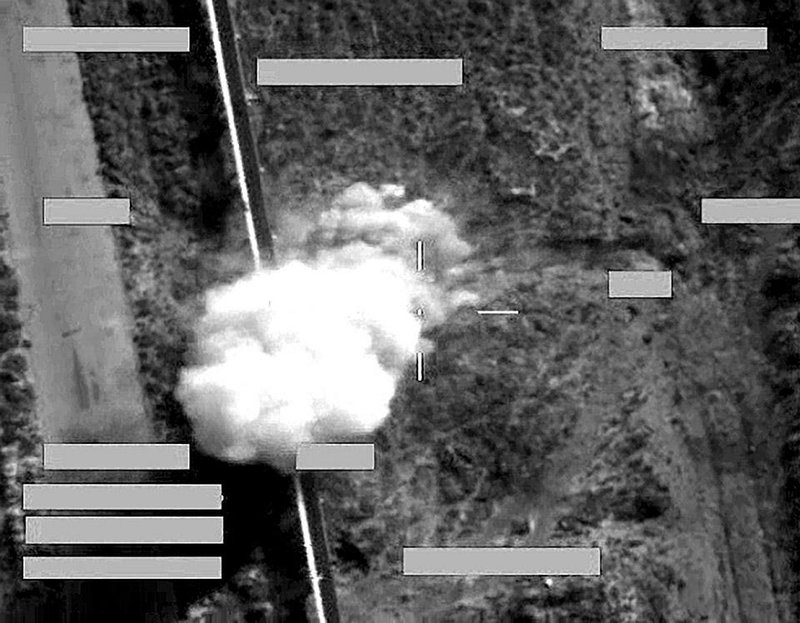BAGHDAD -- Kurdish fighters opened offensives Tuesday against Islamic State militants in several parts of northern Iraq, seizing control of a vital border crossing between Iraq and Syria that has been a major conduit for insurgents moving between the two countries, officials said.
In a pre-dawn push, peshmerga forces of the semiautonomous Kurdistan Regional Government fought their way into the Rabia district near the Syrian border, seizing control of two villages by late morning, officials said. Fighting elsewhere in the district continued through the day, with the peshmerga eventually gaining control of the border crossing, Kurdish officials said.
The Islamic State had controlled Rabia since early June, when jihadi fighters swept across the border from Syria and quickly overwhelmed Iraqi security forces throughout the region, including in Mosul, Iraq's second-largest city.
The militants, who have declared an Islamic caliphate -- or state ruled by Islamic Law -- stretching across eastern Syria and western Iraq, have used a highway between Rabia and Mosul, 70 miles away, to freely transport fighters, weapons, armored vehicles and supplies between the two countries.
"The militants showed fierce resistance, but peshmerga forced them to retreat to the center of the district," said Helgurd Hikmet Mela Ali, a spokesman for the Kurdish force.
Fighting between the peshmerga forces and the Islamic State also broke out in Zumar, about 40 miles northwest of Mosul, near the reservoir of the Mosul Dam, officials said. Zumar has been the site of periodic clashes since early August when militants captured the area.
U.S. warplanes conducted seven airstrikes against the Islamic State in northwest Iraq, destroying one armored vehicle, two transport vehicles and four armed vehicles, the U.S. military said in a statement. Two other U.S. airstrikes destroyed an Islamic State fighting position and an armed vehicle near the Mosul Dam, the military said.
For the first time, British forces joined the airstrike campaign, with Tornado attack jets striking Islamic State positions in support of Kurdish forces, the British Defense Ministry announced.
With the support of airstrikes by warplanes from the U.S.-led coalition, Iraqi and Kurdish forces pushed into Daquq district Tuesday, Iraqi officials said. On Tuesday afternoon, the officials reported that the coalition of forces had taken control of three villages about 20 miles south of Kirkuk, and the district of Tazah, between Kirkuk and Daquq.
But late Tuesday, Brig. Gen. Hussein Mansour, a division commander for the peshmerga, reported that a counterattack by the insurgents had forced the government troops to retreat from the villages, allowing the Iraqi air force to conduct airstrikes on the militants' positions.
Meanwhile, a wave of car bombings and other attacks mainly targeting Shiite areas of Iraq killed at least 47 people on Tuesday, including more than 20 in Baghdad, officials said. No one claimed responsibility for the attacks, but Sunni militants were suspected.
On the Syrian side, coalition jets struck around a Kurdish town near the Syrian-Turkish border that the militants have been attacking for days. Despite the strikes, the militants have pressed their offensive on the town of Kobani, also known by its Arabic name of Ayn Arab, and surrounding villages near Syria's border with Turkey.
The U.S. Central Command said U.S. fighter jets and drones conducted 11 airstrikes Monday and Tuesday in Syria, including three near the Syria-Turkish border that destroyed one artillery piece, damaged another and knocked out two rocket launchers.
It said another strike northeast of Aleppo destroyed four buildings occupied by Islamic State militants. Two strikes reportedly destroyed vehicles, artillery and a tank in eastern Syria and near the Iraq border.
The fighting near Kobani has created one of the single largest exoduses in Syria's civil war, now in its fourth year: More than 160,000 fled the area into Turkey the past few days, the U.N. humanitarian chief Valerie Amos said Tuesday.
Turkey's deputy prime minister said Tuesday that his country's parliament will vote on a motion that would allow foreign forces as well as Turkish soldiers to make incursions into Syria and Iraq from its territory.
The Parliament is scheduled to renew mandates Thursday that authorize Turkey's military to carry out operations in Syria and Iraq. Vice Prime Minister Bulent Arinc said the new permit would merge the two separate mandates for Syria and Iraq, expand the scope to include threats posed by the Islamic State group and also allow the use of Turkey's territory by foreign troops.
Elsewhere on Tuesday, the wife of a British aid worker held hostage in Syria by the Islamic State made a televised plea Tuesday asking her husband's captors to free him.
Alan Henning, a 47-year-old former taxi driver, was kidnapped in December after crossing from Turkey into Syria in an aid convoy. In recent weeks, the militants have released online videos showing the beheading of two American journalists and a British aid worker, and threatened to kill Henning next.
On Tuesday, Barbara Henning asked the militants: "Please release him. We need him back home."
Information for this article was contributed by Kirk Semple, Omar al-Jawoshy, Sarmad Chalabi, Ali Hamza and staff members of The New York Times and by Qassim Abdul-Zahra, Sinan Salaheddin, Cara Anna, Vivian Salama and staff members of The Associated Press.
A Section on 10/01/2014



